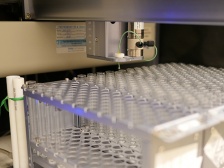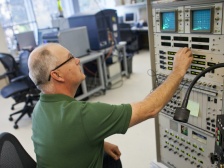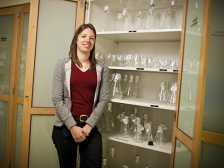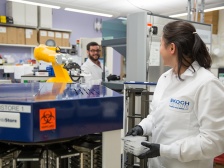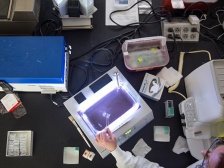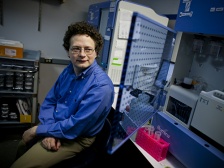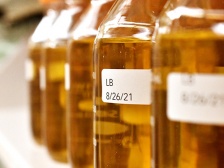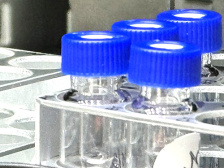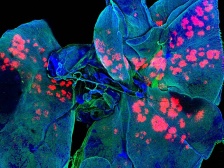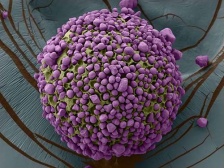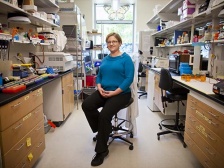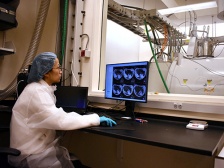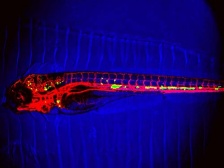Robert A. Swanson (1969) Biotechnology Center
The Koch Institute features 12 core facilities that provide key technical services to our research community. From routine (though essential) support services to advanced technical and consulting services, these cores facilitate and enhance the important research being conducted on a daily basis. Many of the facilities also offer training programs that enable Koch Institute staff, students, and postdoctoral fellows to acquire the additional technical and intellectual expertise needed to advance both their work and their careers.
The costs of many of these cores are partially defrayed by funds from a number of sources, most notably a Cancer Center Support Grant from the NCI to the KI. In recognition of this support, priority access is given to KI members, NCI-funded research projects and other contributing user groups. However, the KI is strongly committed to enabling biomedical research at MIT. Thus, to the extent permitted by available capacity, a number of the cores are accessible to the broader MIT community. See individual cores for details about access, user policies and service rates.
Our Facilities
Instructions for accessing core facilities for internal and external users.
The Biopolymers & Proteomics Core Facility provides MIT researchers with integrated synthetic and analytical capabilities for biological materials, including proteins, small molecules, and nanoparticles.
The Flow Cytometry Core Facility provides high-speed cell sorting services as well as access, training, and support in the use of bench-top analysis flow cytometers.
The Nanowell Cytometry platform is a shared resource housed in the Flow Cytometry Core that provides access to Microengraving and SeqWell technologies.
The Glassware Preparation Core Facility provides centralized services to internal Koch Institute member laboratories, with the primary goal of supplying sterile glassware at an exceptionally high, tissue culture-grade standard.
The High Throughput Sciences Core provides automated screening capabilities, access to curated small molecule and lentiviral shRNA (RNAi) libraries, assay development and screening services in both BL2 and BL2+ space.
The Hope Babette Tang (1983) Histology Core Facility assists investigators in producing quality histological slides from frozen, paraffin-embedded, and resin-embedded tissues.
As part of the Integrated Genomics and Bioinformatics Core, the Genomics Facility provides KI investigators with integrated full service and walk-up facilities for genome-wide analyses.
As part of the Integrated Genomics and Bioinformatics Core, the Barbara K. Ostrom Bioinformatics Facility provides KI investigators with support, assistance and training in a wide range of bioinformatics topics. The core also maintains a high-performance computing resource offering many bioinformatics applications, substantial processing power and secure storage.
The Media Preparation Core Facility provides internal Koch Institute member laboratories with a variety of high-quality custom-made bacterial, yeast, and tissue culture media.
The Metabolite Profiling Core Facility supports research projects at Whitehead Institute, Koch Institute and MIT community by enabling investigators to profile small molecules n a variety of biological samples using high resolution accurate mass Liquid Chromatography Mass Spectrometry.
The Microscopy Core Facility provides experimental consultation, fee-for-service imaging assistance, and training in and access to several imaging platforms, image acquisition equipment, and data analysis software packages.
The Peterson (1957) Nanotechnology Materials Core Facility was established by Thomas F. Peterson, Jr. (1957) to assist investigators in research relating to nanomaterials. The Core offers a broad range of equipment and expertise to work with nanomaterials for the purposes of both characterization and imaging.
The Preclinical Modeling, Imaging & Testing (PMIT) Core’s mission is to navigate and streamline the path from the development of new therapeutic, diagnostic and basic discovery biomedical tools at the bench to their evaluation within a valid biological system.
The Preclinical Modeling, Imaging & Testing (PMIT) Core’s mission is to navigate and streamline the path from the development of new therapeutic, diagnostic and basic discovery biomedical tools at the bench to their evaluation within a valid biological system.
The Zebrafish Core Facility supports researchers in the use of zebrafish as a model organism by providing expert experimental support as well as the expertise, aquatic systems and other infrastructure for maintaining a healthy breeding colony.



